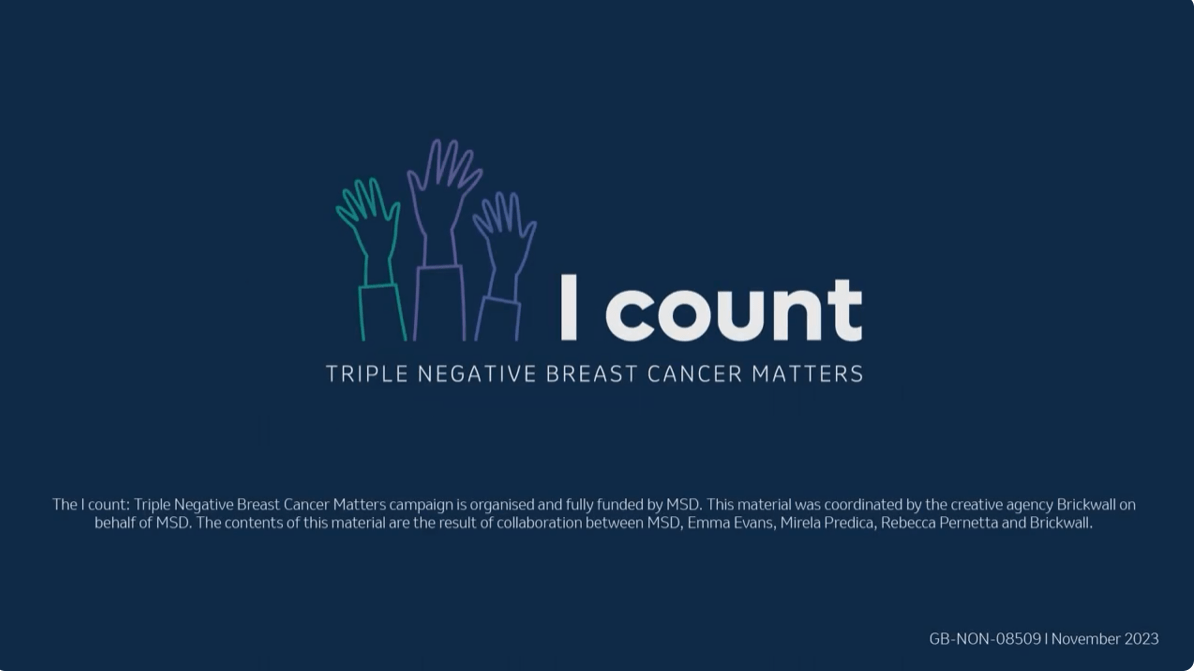MSD, with advice and input from the UK Charity for TNBC, has launched the I count: Triple Negative Breast Cancer Matters campaign to ensure that people with Triple Negative Breast Cancer feel that they count and are being counted.
Whilst breast cancer remains the most common cancer in the UK for women[1] , survival has doubled in the last 50 years[2], exemplifying the advancements that can be made for patients. Despite this progress, there is more to do.
What is Triple Negative Breast Cancer?
Triple Negative Breast Cancer (TNBC) is a subtype of breast cancer. It accounts for around 10-20% of new breast cancer diagnoses[3] and is responsible for 30-40% of all breast cancer deaths,3] according to international data. TNBC tumours generally spread faster than other types of breast cancer[3]. This type of breast cancer disproportionately affects women under the age of 40 and women who are black.[4] Due to the younger average age of those with TNBC, many are in the middle stages of their career and have caring responsibilities. A TNBC diagnosis can make a person feel like their world has come crashing down. [5]

“I was told that my life expectancy could be as little as 18 months… I remember just lying there all night, all these thoughts about kids going to university, seeing them graduate or get a job or find a partner or get married, you say, well… that’s no longer definitely my future anymore.”
– Becky Pernetta, a patient living with TNBC[5]

What are the experiences of people with Triple Negative Breast Cancer?
Despite the wide-ranging impacts of TNBC, there is very little published information that focuses on the experiences of people with TNBC in England. We know from speaking to patients, healthcare professionals and those working in the charity sector that many people with TNBC feel their voice is not being heard[6].

“We feel we’re a bit forgotten about because a lot of the focus has been on hormone positive cancers. When you’ve got triple negative breast cancer, there’s this sense that, well, what about us?”
– Emma Evans, a patient living with TNBC

We also know that there is a significant data gap around Triple Negative Breast Cancer[7]. The recent data on TNBC published by the NHS[8] is neither routinely published nor consistent with the common estimate of TNBC prevalence[9]. The lack of accurate data and information on how many people are living with Triple Negative Breast Cancer in England, and the quality of care they receive, means that it is difficult to quantify the anecdotal experiences of people living with TNBC, so that their voices are not being heard by policymakers.

“The government have to be educated on triple negative breast cancer, to know the differences between that and other types of breast cancer.”
– Becky Pernetta

How can the experiences of people with Triple Negative Breast Cancer be improved?
We have sought to give a platform to the TNBC community through the ‘I count’ campaign. We want to shine a spotlight on TNBC to ensure that people with TNBC feel they count and are being counted by the people and institutions with the power to shape cancer services in England.
The I count campaign sets out a number of recommendations which, if realised, will ensure patients are put first. Achieving this includes more accessible and holistic support, refining treatment pathways and closing the data gap. Ultimately, we want every person with TNBC and their family to receive the very best care and support for them.
You can learn more about the I count campaign and our call to action by downloading this infographic.
You can also hear Emma and Mirella’s tell their stories on our YouTube. To find out how you can support the campaign, please contact natasha.silkin@msd.com
This campaign was funded and developed by MSD, with advice and input from the UK Charity for TNBC.
[1] Cancer Research UK. Breast cancer statistics: breast cancer incidence (invasive). https://www.cancerresearchuk.org/health-professional/cancer-statistics/statistics-by-cancer-type/breast-cancer#heading-Zero
[2] Cancer Research UK. Breast cancer statistics: breast cancer mortality. https://www.cancerresearchuk.org/health-professional/cancer-statistics/statistics-by-cancer-type/breast-cancer#heading-Three
[3] Manzano, A. et al. Improving the care of women with triple-negative breast cancer. The Swedish Institute for Health Economics (IHE). 2023 https://ihe.se/wp-content/uploads/2023/03/IHE-Report-2023_2_.pdf
[4] UK Charity for TNBC. What is Triple Negative Breast Cancer and What Does It Mean For Me? https://www.ukcharityfortnbc.org/what-is-tnbc-and-what-does-it-mean-for-me
[5] MSD. TNBC patient testimonial film, 2023, https://www.youtube.com/watch?v=87Ypqf99GIQ
[6] MSD. Narrative Health, commissioned on MSD behalf, conducted interviews with patients on their TNBC support needs in 2023.
[7] National Audit of Breast Cancer in Older Patients. New national audits of primary breast cancer and metastatic breast cancer. https://www.nabcop.org.uk/resources/naopri-and-naome/
[8] NHS Digital. Breast cancer incidence (ICD-10 C50) by hormone receptor status. 2023. https://digital.nhs.uk/supplementary-information/2023/breast-cancer-incidence-icd-10-c50-by-hormone-receptor-status
[9] Cancer Research UK. Triple negative breast cancer.https://www.cancerresearchuk.org/about-cancer/breast-cancer/types/triple-negative-breast-cancer
GB-NON-08612 | November 2023

